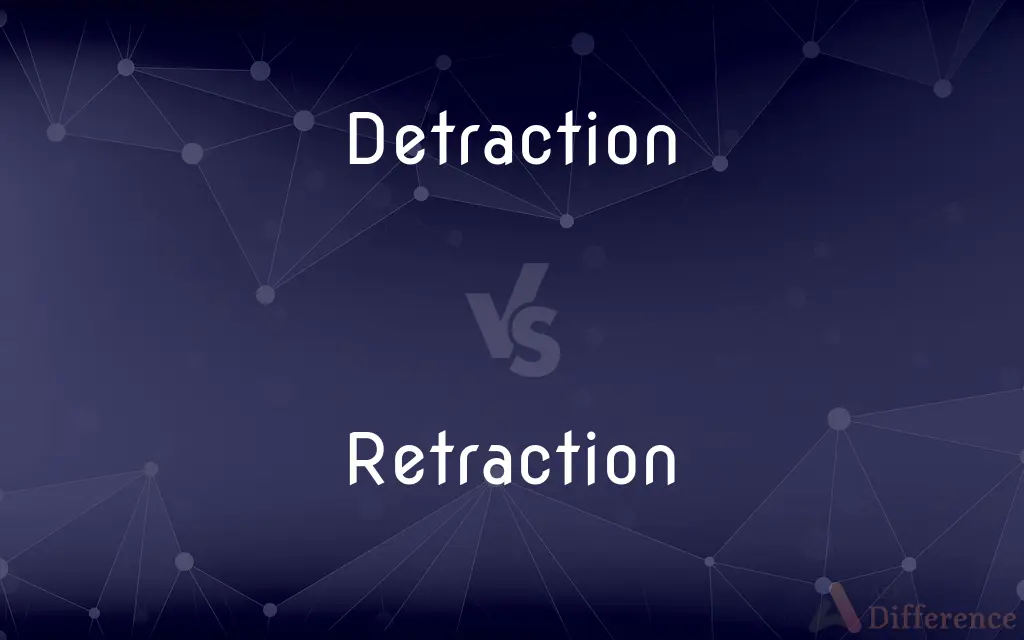Detraction vs. Retraction — What's the Difference?
By Urooj Arif & Maham Liaqat — Updated on March 21, 2024
Detraction involves diminishing someone's reputation through criticism, while retraction is withdrawing a statement as incorrect or unjustified.

Difference Between Detraction and Retraction
Table of Contents
ADVERTISEMENT
Key Differences
Detraction is the act of speaking damagingly about someone, which can harm their reputation or character, often based on partial truths or misrepresentations. On the other hand, retraction is the process of formally taking back, withdrawing, or disavowing a previously made statement or publication, typically because it was found to be false or misleading.
Detraction often arises from the intent to harm or belittle another's reputation through negative comments or criticisms, suggesting a malicious motive. Whereas retraction usually follows the realization or acknowledgment that an error has been made, indicating a concern for truth and accuracy.
While detraction may spread through informal channels like gossip or rumors, impacting someone's social standing without any official acknowledgment, retraction is a formal acknowledgment of an error, often published in a public medium to correct a previously stated fact.
Detraction does not necessarily involve false information but can be based on truth that is presented in a biased or harmful way. Conversely, retraction is typically concerned with statements that are factually incorrect or unsubstantiated, aiming to correct the public record.
Detractions can be subtle and insidious, making them difficult to address or rectify, as they may involve opinions or implications rather than outright falsehoods. In contrast, retractions are clear and direct, offering a specific correction to a specific error, and are usually documented or recorded in some way.
ADVERTISEMENT
Comparison Chart
Definition
Diminishing someone's reputation
Withdrawing a statement as incorrect
Intent
Often malicious
Concern for truth
Mode of Spread
Informal (e.g., gossip)
Formal (e.g., publications)
Information Type
Can be true or false
Factually incorrect
Rectification
Difficult to rectify
Clear and direct correction
Compare with Definitions
Detraction
Using partial truths for a negative portrayal.
Her detraction relied on out-of-context quotes.
Retraction
Formal apology for a mistaken publication.
The retraction came with an apology to those affected.
Detraction
Maliciously undermining someone's achievements.
The article's detraction of her success sparked outrage.
Retraction
Withdrawing a false statement publicly.
The newspaper issued a retraction of the inaccurate report.
Detraction
Insinuating faults in someone to belittle them.
His constant detraction of colleagues created a toxic workplace.
Retraction
Correcting the record after misleading statements.
After evidence surfaced, a retraction was inevitable.
Detraction
Spreading negative information to harm someone's reputation.
The detraction in the community was subtle but damaging.
Retraction
Publicly taking back an unjustified accusation.
The retraction of the allegations helped restore his reputation.
Detraction
Diminishing someone's worth through criticism.
His detraction of the author's work was seen as envy.
Retraction
Acknowledging an error in previously stated information.
The author's retraction was published in the next edition.
Detraction
In Christian theology, detraction is the sin of revealing another person's real faults to a third person without a valid reason, thereby lessening the reputation of that person. It holds, in the Roman Catholic Church, the status of a mortal sin from the perspective of moral theology.
Retraction
The act of retracting or the state of being retracted.
Detraction
The act of detracting or taking away.
Retraction
The act of recanting or disavowing a previously held statement or belief.
Detraction
A derogatory or damaging comment on a person's character or reputation; disparagement
The candidate responded sharply to the long list of detractions concocted by his opponent.
Retraction
A formal statement of disavowal.
Detraction
The act of detracting something, or something detracted; taking away; diminution.
Retraction
The power of drawing back or of being drawn back.
Detraction
A derogatory or malicious statement; a disparagement, misrepresentation or slander.
Retraction
An act or instance of retracting.
Detraction
(Roman Catholic Church) The act of revealing previously unknown faults of another person to a third person.
Retraction
A statement printed or broadcast in a public forum which effects the withdrawal of an earlier assertion, and which concedes that the earlier assertion was in error.
Detraction
A taking away or withdrawing.
The detraction of the eggs of the said wild fowl.
Retraction
(mathematics) A continuous function from a topological space onto a subspace which is the identity on that subspace.
Detraction
The act of taking away from the reputation or good name of another; a lessening or cheapening in the estimation of others; the act of depreciating another, from envy or malice; calumny.
Retraction
The act of retracting, or drawing back; the state of being retracted; as, the retraction of a cat's claws.
Detraction
A petty disparagement
Retraction
The act of withdrawing something advanced, stated, claimed, or done; declaration of change of opinion; recantation.
Other men's insatiable desire of revenge hath wholly beguiled both church and state of the benefit of all my either retractions or concessions.
Detraction
The act of discrediting or detracting from someone's reputation (especially by slander);
Let it be no detraction from his merits to say he is plainspoken
Retraction
The act of retracting or shortening; as, the retraction of a severed muscle; the retraction of a sinew.
Retraction
A disavowal or taking back of a previous assertion
Retraction
The act of pulling or holding or drawing a part back;
The retraction of the landing gear
Retraction of the foreskin
Common Curiosities
Is retraction always formal?
Typically, retraction is a formal process, especially when correcting public records or published information.
What is retraction?
Retraction is withdrawing a previously made statement, acknowledging it as incorrect or unjustified.
How do detraction and retraction differ in intent?
Detraction often has a malicious intent to harm someone's reputation, while retraction is motivated by a concern for truth and correcting mistakes.
What is detraction?
Detraction is the act of diminishing someone's reputation through criticism or negative information.
Can anyone issue a retraction?
Anyone who has made a public statement or publication can issue a retraction when necessary.
Can detraction be based on truth?
Yes, detraction can be based on truth but presented in a biased or harmful manner.
What makes detraction difficult to rectify?
Since detraction often involves opinions or insinuations rather than outright falsehoods, it's challenging to address directly.
Why is retraction important?
Retraction is important for maintaining accuracy and integrity in information dissemination.
How do retractions affect public perception?
Retractions can restore credibility by demonstrating accountability, though they may also highlight previous errors.
How do organizations handle retractions?
Organizations usually follow formal procedures to publicly correct the record and ensure the retraction reaches the same audience as the original statement.
Why might someone engage in detraction?
Reasons vary, including jealousy, rivalry, or a desire to undermine someone's achievements or character.
What impacts does detraction have?
Detraction can damage an individual's social standing or reputation, often through subtle means.
Can detraction be legal?
While legal in some contexts, detraction can cross into defamation if it involves false statements that damage someone's reputation.
What are the consequences of not retracting false information?
Failing to retract false information can lead to legal consequences, loss of credibility, and damage to relationships or professional standing.
What is the usual process for issuing a retraction?
Issuing a retraction typically involves acknowledging the mistake, clarifying the correct information, and sometimes apologizing.
Share Your Discovery

Previous Comparison
Skill vs. Asset
Next Comparison
Gleam vs. ShineAuthor Spotlight
Written by
Urooj ArifUrooj is a skilled content writer at Ask Difference, known for her exceptional ability to simplify complex topics into engaging and informative content. With a passion for research and a flair for clear, concise writing, she consistently delivers articles that resonate with our diverse audience.
Co-written by
Maham Liaqat















































